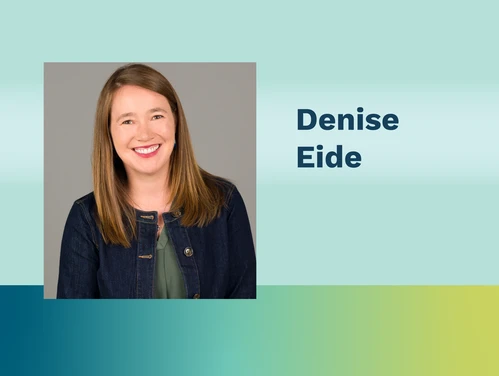Building strong literacy skills can unlock a child’s unlimited potential for success. Just ask Denise Eide, national speaker, author and CEO and founder of Logic of English, a mission-driven publisher that empowers students of all ages to become fluent readers and spellers. As a mom with two sons who struggled with learning how to read, Eide fully understands the power of literacy and using evidence-based education practices.
Today, Eide is dedicated to helping educators, parents and other individuals find success with strengthening student literacy skills. She will be bringing her keys to success to Iowa as the keynote speaker for the upcoming 2025 Science of Reading Summit for Educator Preparation on June 5-6 in Johnston. Her empowering session will provide new insights into the Science of Reading for teacher preparation programs and offer best practices for instruction.
Eide is an author of the award-winning book, “Uncovering the Logic of English,” and presents on literacy skills and the Science of Reading to audiences across the country.
Below, Eide shares her thoughts on why evidence-based literacy instruction is important and how her personal journey with her family has inspired her life’s work.
One of the goals at the Iowa Department of Education is to equip Iowa's future workforce with a strong foundation in literacy. Why is it important to equip faculty who prepare teachers in Science of Reading methods?
Educators enter the field to help students succeed. Despite good intentions, too many of our students are facing challenges as readers and spellers. The Science of Reading summarizes what studies across multidisciplinary fields say about how to teach reading most effectively. By equipping faculty with this knowledge, we help them to be more effective in the classroom and thereby increase the joy of learning and teaching by helping students succeed.
You have noted that strong phonemic awareness is a foundational skill of reading. Why do you think it is so vital for building literacy skills?
Phonemic awareness is the understanding that all spoken English words are made up of combinations of one or more of the 45 speech sounds. Words can be segmented into individual speech sounds, and speech sounds can be blended back into words. Understanding this vital concept unlocks the relationship between phonics (the written code) and speech. Written words are written speech sounds. When we read, we blend those sounds back into words, using phonemic awareness skills.
Your family has been a huge inspiration for your life’s work as the president and founder of Logic of English. Can you briefly tell us about how your role as a mom with two sons who were learning how to read kicked off your journey?
I have twin sons who, as toddlers and preschoolers, LOVED books. Every day we read together as a family. Yet, when it came time for them to learn to read, they struggled to advance beyond Decodable Readers. They could read, "Sam sat," and "Kate ate." Yet, they misread words like is and have. By the time they were seven, they hated reading and would cry if they were asked to read aloud. It broke my heart, so I went on a search for how to help them. That is when I discovered that there are programs often reserved for students with dyslexia that teach a more complete understanding of English. I discovered S says two sounds /s/ and /z/, and a silent E is added to words ending in V. When I introduced a more complete understanding of phonics to my sons and used this information to analyze words, they began to read chapter books within a few months. Their experience illustrates the Simple View of Reading. Reading with comprehension is a product of both language comprehension, which they developed from all the books we read aloud, and the ability to decode. Logic of English was born out of this experience and my desire to make this knowledge accessible to all teachers and students.
What do you want attendees to walk away with from your session at the Science of Reading Summit?
One of the biggest misconceptions about English is that it is riddled with exceptions; therefore, students need to memorize how to read and spell words by rote. I want participants to walk away with a new curiosity about written English. I also hope they feel inspired that they can teach students how to read and spell any word in English!
Are there any other thoughts you would like to share?
I am looking forward to joining you for the Science of Reading Summit for Educator Preparation! I always learn something from participants' questions and observations. Thank you so much for inviting me. It is truly an honor and a joy.
